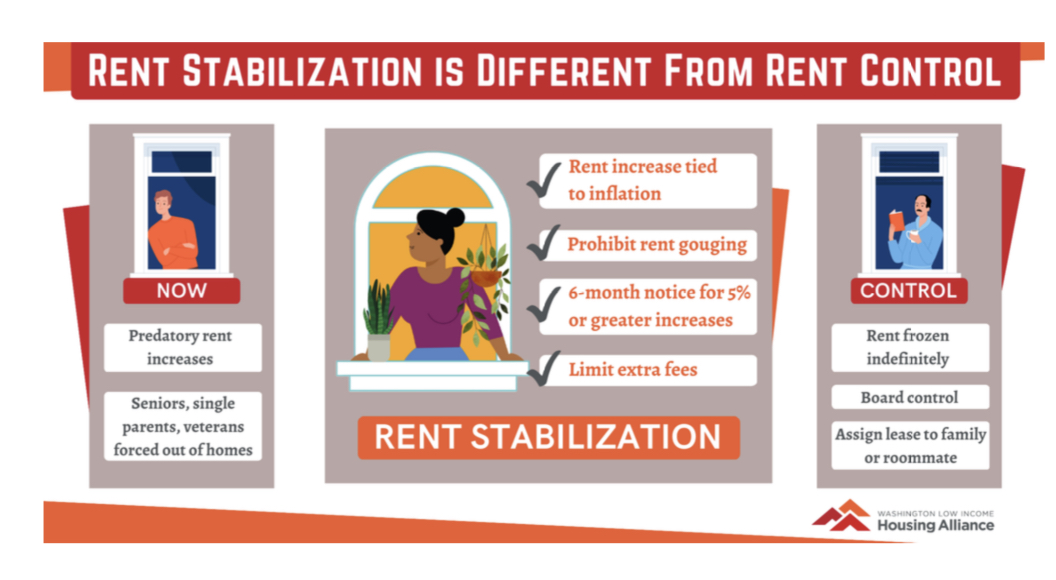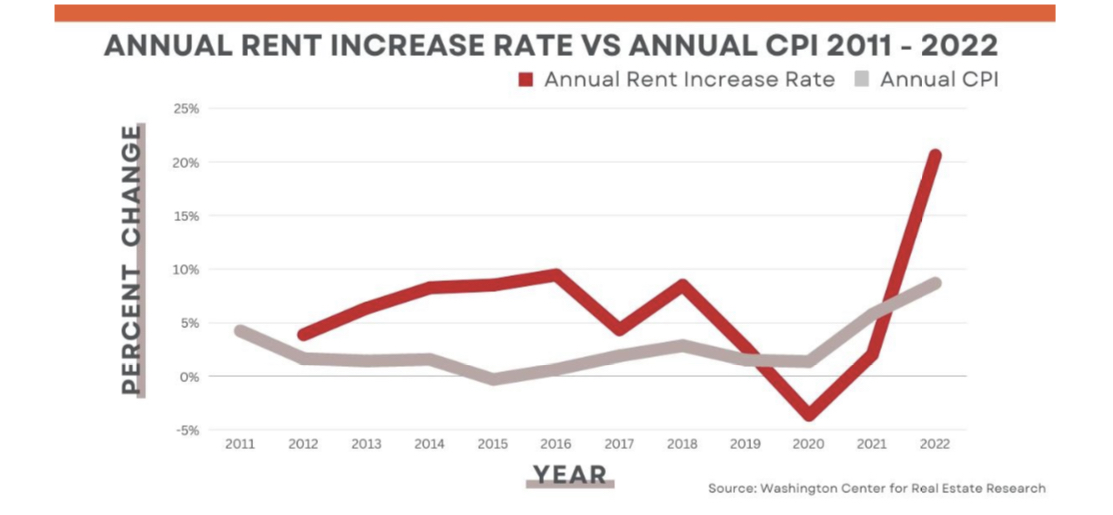Download this one pager as a PDF:
Shelter is a basic human need, essential for equitable, healthy, safe, and stable communities. Rent gouging, excessive fees, and short notice of rent increases destabilize families and workers, and is the number one contributor to Washington’s housing crisis.
State action is needed now to stabilize rent increases, provide tenant households with more predictability on future rent increases, while still allowing landlords to raise the rent and make a fair profit. These critical changes in the law will help ensure millions of renters in Washington can stay in their homes and bring balance to the landlord and tenant relationship.
Rent stabilization is critical to helping Washington’s renter households stay housed, preventing further homelessness, and ensuring rent increases can’t be used to punish tenants or to deny them of their rights under the law. Tackling the housing crisis is a top concern for Washington voters of all incomes, and a top priority for state legislators this session.
Rent Stabilization is Different From Rent Control
Rent stabilization is not the same as rent control, whose policies commonly include freezing rents indefinitely, controls on rents after a tenant vacates and lease assignability to family members or roommates. However, “rent control” policies appear to be popular with Washington voters, according to a recent survey by the WA State Department of Commerce (p. 56).)

Rent Stabilization Solutions
Unlike rent control which freezes rental rates on a unit, rent stabilization regulates the relationship between the landlord and tenant and provides predictability to rent increases that a tenant can expect. The bills introduced by Washington State Representatives Macri and Ramel also recognize that there are times when it is appropriate and fair to provide landlords with more flexibility or even exemptions.
Rent stabilization proposals that will be considered by Washington legislators this year include:
- Reasonable and more predictable rent increases (HB 1389 and SB 5435): Allow landlords to increase rent by 3% or inflation, whichever is higher, but not more than 7%. Allow larger rent increases for major repairs, new buildings, hardship or when the landlord “banked” rent increases by not raising the rent in prior years.
- Stop rent increases from being a tool to punish, displace or deny tenants of their rights (HB 1388). Provide tenants with a mechanism to challenge excessive rent increases that would result in displacement, deny them of their rights under the law or that are issued when the landlord is not abiding by their duties under the law.
- More time to adjust to rent increases (HB 1124): Provide 6 months notice to tenants for rent increases of 5% or more, cap late fees at $75 and allow tenants to move after a significant rent increase if they can secure housing within their price range.
- Prevent the displacement of homeowners in manufactured parks (HB 1129/Gregerson and SB 5189/Frame): Require longer notice of manufactured park closures to homeowners, and allow nonprofits with the intent to preserve the community the opportunity to purchase.
WA Rental Rates Far Outpacing Inflation
According to recent polls, homelessness, housing costs and rising rent top the list of Washingtonians’s concerns (Elway-Crosscut Poll, State of Washington/Puget Sound Regional Council Survey).
Rental rates skyrocketing across Washington
Seattle Area (Mar. 2020 - Aug 2022)
⬆17.0%
Spokane (Mar. 2020 - Mar. 2021)
⬆32.0%
Tacoma (Oct. 2020 - Oct. 2021)
⬆18.9%
Pasco (Jan. 2022 - Jan. 2023)
⬆15.0%
Yakima (2019 - 2022)
⬆29.7%
Bremerton-Silverdale-Port Orchard (2019 - 2022)
⬆40.7%
Mount Vernon-Anacortes (2019 - 2022)
⬆33.2%
Statewide rental rate increases compared to inflation (CPI) 2011 - 2022
- Economic evictions are on the rise, forcing more people into homelessness. Evictions have increased every year in Washington state with the exceptions of 2020 & 2021 when the COVID eviction moratorium was in place.
- Many low income households pay more than 50% of their incomes to rent. Rent increases are forcing vulnerable populations like seniors, single parents, and veterans to grapple with impossible choices between paying the rent, or paying for medication, food and other basic needs.
- Studies show that every $100 in median rent increases leads to a 9% increase in homelessness.
- According to HUD’s annual 2022 assessment, Washington was second only to California in the number of residents living outside un-sheltered.
Summary of Rent Stabilization Bills
Bills introduced this session include measures to stop excessive rent hikes, give renters more stability by being able to know the highest possible rental increases, and empower the Attorney General to go after unscrupulous landlords who break the law or who use rent increases to deprive tenants of their rights.
HB 1388 introduced by Representative Nicole Macri (D-43):
- Prohibits "excessive rent increases” if not justified by costs necessary to maintain the dwelling unit, is substantially likely to force the tenant or household to move or involuntarily relocate from the home, or is used as a means to avoid other protections afforded to tenants under state law or any other source of legal rights.
- “Excessive rent” is defined as a rent increase during a 12-month period that is greater than the rate of inflation as measured by CPI-U (West Region) or 3%, whichever is greater, up to a maximum or 7%.
- New rental exemption: If the first certificate of occupancy for the dwelling unit was issued 10 years or less before the notice of the rent increase, rent increases for the dwelling unit are exempt.
- Publicly funded properties: If the tenancy is in a federally funded property owned or operated by a public housing authority, or in a property that is funded through a state housing assistance program, rent increases during the tenancy are limited by the fund sources, not these bills.
- Protect existing rights and prevent rent increases from being used to get around the law: For example, prohibit landlords from charging significantly more, or placing more burdensome requirements, on month to month tenants than for longer term tenants. Landlords are currently getting around just cause termination protections afforded to month-to-month tenants by threatening extremely higher rent increases if a tenant chooses to go month to month.
- Gives the Attorney General’s office back their authority to enforce state tenant protections with regard to violation of the Residential Landlord-Tenant Act, the Manufactured/Mobile Home Landlord-Tenant Act by a landlord, or the Consumer Protection Act.
- Enforcement: Authorizes fines of up to $25,000 per landlord violation.
HB 1389 introduced by Representative Alex Ramel (D-40):
- Stabilize rent increases: Prohibits rent increase during the first year of tenancy, prohibits rent increase during any 12-month period that is greater than the rate of inflation or 3%, whichever is greater, up to a maximum or 7% above existing rent.
- Improvement exemption: If a landlord has paid for improvements to the dwelling unit that cost more than 4 month’s rent and the improvements were made during the 12 months.
- New rental exemption: If the first certificate of occupancy for the dwelling unit was issued 10 years or less before the notice of the rent increase, rent increases for the dwelling unit are exempt.
- Publicly funded properties: If the tenancy is in a federally funded property owned or operated by a public housing authority, or in a property that is funded through a state housing assistance program, rent increases during the tenancy are limited by the fund source, not these bills.
- Hardship exemption: If a landlord is experiencing significant hardship in complying with the maximum annual rent increase percentage for the current calendar year due to a disparity between the local costs for providing housing and the statewide costs for providing housing, the landlord may request an individual exemption from the department.
- Banked capacity exemption: Landlord may increase the rent by an additional 3% for each year that the landlord has banked capacity. Banked capacity transfers with property upon sale.
- Notice of large increases: Requires a landlord that increases rent above the limit to include facts supporting the exemption in the written notice of the rent increase.
- Enforcement: Private cause of action
HB 1124 introduced by Representative Strom Peterson (D-21):
- Require landlords to provide at least 180 days' and no more than 220 days' notice for rent increases over 5 percent.
- Allow a tenant to terminate a tenancy without penalty for any rent increase over 5 percent.
- Limit late rental payment fees under the Residential Landlord-Tenant Act to $75.
For more information contact: Michele Thomas, michelet@wliha.org


